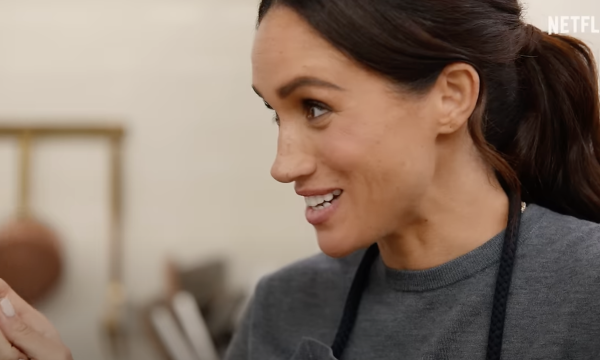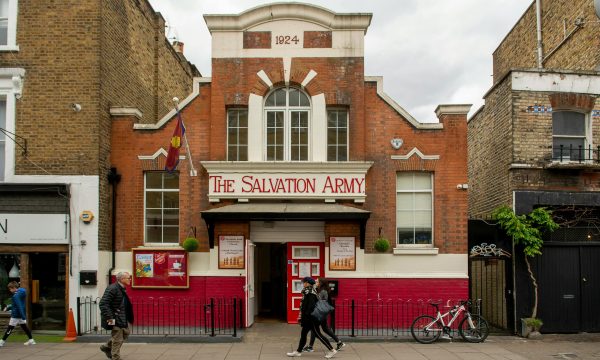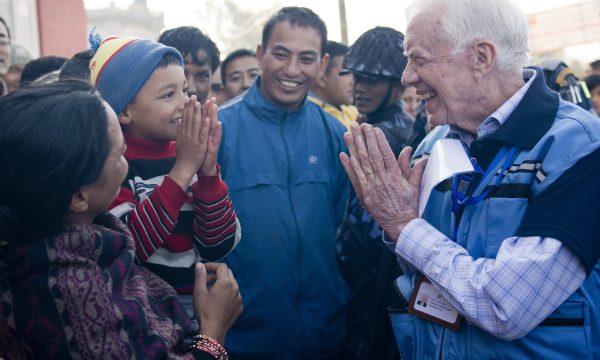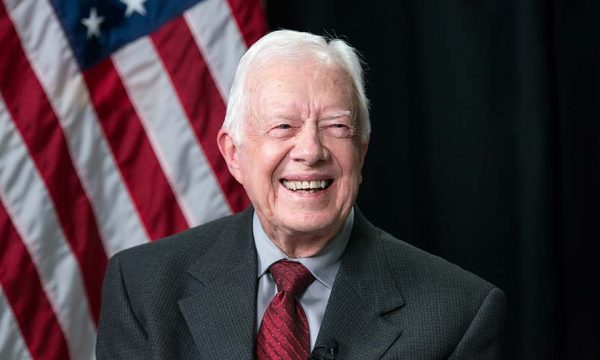 Anthony Anderson may not be what you call a household name; more like household-ish, but he sure as heck is a “household face.” If you have been watching television or movies anywhere in the past 20 years, you’ve seen his face and you know his work. Anderson has appeared in over 20 films, and his performance on the longtime NBC hit drama “Law & Order,” earned him his fourth consecutive NAACP Image Award nomination for Outstanding Actor in a Drama Series for the 2010 season. He has shared the screen with such Hollywood notables as Jack Nicholson, Leonardo DiCaprio and Matt Damon in Martin Scorsese’s Oscar winning feature, “The Departed,” as well as Jim Carrey, Eddie Murphy and Cicely Tyson, just to name a few. Anthony Anderson grew up in the impoverished community of Compton, California, where he and his mother apparently had the same idea about education. Anderson said, “I’m the oldest of four, and my mother didn’t want me to go to high school in Compton. My younger brothers and sisters were going to school in Torrance and Compton, and my mother just felt there was a better school district for me to go and I was in one of my weekend acting classes, and I saw this note on this invite on the flyer on the wall that said, ‘The Fame school is coming to L.A. High School for the Performing Arts.’ And I took one of the flyers and I brought it home, and I asked my mother if I got accepted into the school, if I could go there. She was like, ‘Yeah, if you get accepted, you can go there.’ So I put my stuff on tape; I auditioned, wrote an essay, sent it in, and I was accepted into the Los Angeles County High School for the Performing Arts, their inaugural class. I did my tenth and eleventh grade years there, and then I transferred over to Hollywood Performing Arts Magnet my senior year. That’s how that all happened.”
Anthony Anderson may not be what you call a household name; more like household-ish, but he sure as heck is a “household face.” If you have been watching television or movies anywhere in the past 20 years, you’ve seen his face and you know his work. Anderson has appeared in over 20 films, and his performance on the longtime NBC hit drama “Law & Order,” earned him his fourth consecutive NAACP Image Award nomination for Outstanding Actor in a Drama Series for the 2010 season. He has shared the screen with such Hollywood notables as Jack Nicholson, Leonardo DiCaprio and Matt Damon in Martin Scorsese’s Oscar winning feature, “The Departed,” as well as Jim Carrey, Eddie Murphy and Cicely Tyson, just to name a few. Anthony Anderson grew up in the impoverished community of Compton, California, where he and his mother apparently had the same idea about education. Anderson said, “I’m the oldest of four, and my mother didn’t want me to go to high school in Compton. My younger brothers and sisters were going to school in Torrance and Compton, and my mother just felt there was a better school district for me to go and I was in one of my weekend acting classes, and I saw this note on this invite on the flyer on the wall that said, ‘The Fame school is coming to L.A. High School for the Performing Arts.’ And I took one of the flyers and I brought it home, and I asked my mother if I got accepted into the school, if I could go there. She was like, ‘Yeah, if you get accepted, you can go there.’ So I put my stuff on tape; I auditioned, wrote an essay, sent it in, and I was accepted into the Los Angeles County High School for the Performing Arts, their inaugural class. I did my tenth and eleventh grade years there, and then I transferred over to Hollywood Performing Arts Magnet my senior year. That’s how that all happened.”
That experience is what stoked the fire in him to become an actor and performer in the entertainment field. But in the quest to find his creative voice, Anderson tried standup comedy early on and met with disastrous results. “My first attempt at it was pretty humbling. I was booed off the stage, they turned off my mic, and they turned off my light. But it’s just you, and a microphone, and an audience up there. You are the producer, the director, the writer, and all of that. You feel what works and what doesn’t work instantly, because the feedback is right there. No, it didn’t work out for me the first time at all, and it kept me away from doing it for quite some time. It shook me that bad. I never really considered myself to be a stand-up; I was just a comedic actor. But I wanted to get my foot wet in that world and that’s what happened.”
Getting his “foot wet,” is an understatement inasmuch as Anderson has produced a resume of acting credits as long as a runway. He has become quite a creative force and is primed to take his career to the next level as star and executive producer of a brand new hit sitcom on ABC called, “Black-ish.” The comedy co-stars Tracee Ellis Ross and Laurence Fishburne. Anderson plays the main character in a series that takes a humorous, yet bold look at one man’s determination to establish a sense of cultural identity for his family, while raising his kids in a predominantly white, upper-middle-class neighborhood. The show’s premiere episode generated the kind of ratings numbers that make network executives salivate, especially when generated by a new show. The airing drew a 3.3 rating with adults 18-49 and 10.8 million viewers. LATF got a chance to talk to the versatile actor by phone during what has become a very busy schedule.
What was it that made you pursue a career as an actor, since you started off with stand-up?
I’ve always been an actor. Stand-up was something that I just wanted to try. All I ever wanted to do since I was nine years old was be an actor. I wanted to play football for the Dallas Cowboys, I wanted to be a lawyer, and I wanted to be an actor. And at the age of nine, I realized that if I became an actor, I could be all three of those things, and whatever else I wanted to become in life.
You were born and raised in Compton graduated from Hollywood High, did you commute from Compton to Hollywood every day?
It was a two hour bus ride from Compton. The L.A. High School for the Performing Arts was on the campus of Cal State L.A, so I would wake up at 5:30, be on the bus at 6, and would get to school at 7:50, and school started at 8. And school ended at 4, so at 4:30, I was on the bus. At 6:30 I was just walking through the door at home.
You can see the dedication when you had to go through all of that to get to the next step.
This is all I ever prepared myself to do, man. Call it naiveté, call it foolishness or whatnot, but I didn’t prepare myself for anything else but this. I believe that this is what my energy was created to do. This is why I’ve been placed on this earth — to entertain and to share this gift that I’ve been blessed with.
You’ve been very active in both film and television for about 20 years —to what do you attribute your success there?
Diversity. I attribute it to diversity. My first 20-plus films have all been comedic films, and they’ve been with some of the greats — Eddie Murphy, and Martin Lawrence, and Obba Babatundé, and Bernie Mac, and Cicely Tyson, and the Farrelly brothers and Jim Carrey. So before I got typecast as just the fat, funny guy and all that, I decided to take it upon myself to take a step back, and show my dramatic side, just so I wouldn’t be pigeon-holed into that. From that, I did shows like “Law & Order: SVU,” which got me onto “Law & Order” for the last three years of its run. I did movies like “Hustle & Flow.” I did television shows like “NYPD Blue,” and there were detective roles like Antwon Mitchell on “The Shield.”
And so that showed Hollywood and my core audience that I wasn’t just a funny guy. It’s like, ‘Oh no, wait a minute, he runs the gamut!’
That’s excellent.
Yeah, and because of that, I was able to work with Martin Scorsese in “The Departed,” and go on and do other things, so I attribute my longevity in this industry for having a plan for the future, and not just the immediate present. In order to have longevity, I had to show them other facets of my talent, and that’s what I’ve done.
Do you prefer film or television?
That’s like asking me which one of my children I love more.
(laughs) I thought you might say that.
I love them both, but I love them differently. That’s like asking you, ‘Which one of your jams do you like most, or which one is a “B” side? When you love what you do, you do it.
Fair enough. Let’s get back to the sitcom “Black-ish.” What is the message that you’re trying to convey through that show?
We don’t try to hit you over the head with a message. What our show is doing is talking about issues and ‘ish,’ you know, that a black family is going through being a first generation, successful family, and giving your children a better upbringing than what you had growing up.
And it’s universal — it’s not unique to just black people and the characters on this show that we’re doing. It’s a universal thing that for anybody who’s out there striving for the American dream, if you’re not careful in your quest for this dream and assimilation, you lose a little bit of who you are. That’s what it says, it’s like it’s okay to be who you are and to soar to these heights and to be in these places. And it’s really just about a family that loves one another, that wants to have the best of everything for all. But it’s the ‘ish’ that goes along with it and we all have our ‘ish’ that we deal with. It so happens that we’re black, and we’re dealing with this ‘ish.’
Read Full interview here: http://latfthemagazine.com/magazine/046/anthonyanderson.html














